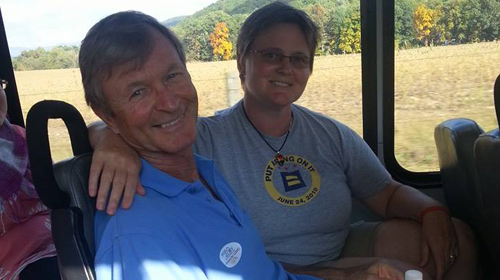
It was a frigid winter night, and my daughter Sarah was in her college years. She called to ask me to drive up to Burlington, Vermont, as soon as possible. She had something important to tell me. During the four-hour drive, my mind raced with the possibilities of what could be wrong. When I got there Sarah burst into tears. She wanted to tell me that she and a female friend were in love and were moving in together.
Until this moment, Sarah had been in a relationship with her boyfriend since high school. I told her that regardless of her sexual orientation, her happiness was the most important thing to me. Two decades later, I am blessed to have Sarah, her partner Dawn, and their beautiful sons Jay and Gray to call my family.
What you might be surprised to learn, however, is that I too have been in a same-sex partnership since Sarah was seven years old.
Yet despite that more-than-a-decade-long relationship, despite all of Sarah's friends who were in same-sex relationships, her experience of coming out to me was just as emotional and traumatic for her as it would have been had her parents been heterosexual.
Of course, that was 20 years ago. We have progressed since then in many ways. Even so, our society continues to struggle with homophobic messages and prejudice โ in both subtle and overt ways. The most significant of these today is the denial of freedom to marry and be recognized legally as partners in this state we all call home.
As I write this, the federal appeals court is weighing whether or not to overturn a ban on marriage for same-sex couples in Virginia and bring marriage equality to the state. This means that not only symbolically, but also literally, that every single same-sex couple in Virginia is a plaintiff in this case, including my daughter and her wife. I hope that this sends a message to all young people struggling with coming out as gay or lesbian that they are not alone. I also hope that the court rules in a way that makes it possible for the next generation of gay and lesbian young people to never assume that they are alone.
My husband Glenn and I were happy to see Dawn and Sarah get married here, in front of the same house in Massachusetts that Sarah helped me to build many years before.
We were proud to be able to provide a place for them to do that. It was, however, heartbreaking that they couldn't get married in Virginia โ in their home, in their community. After the wedding, Dawn and Sarah threw themselves a wedding reception in Virginia where their union was blessed and honored by a local minister and they were surrounded by loving and supportive family and friends.
I recall both of these events with affection on this father's day โ grateful for the loving and caring environment that has allowed my daughter to be true to herself and live the life she wants with the person she loves. But I'm also concerned. Our grandsons Jay and Gray are currently denied rights and benefits that children of 'traditional' heterosexual marriages receive, and Sarah and Dawn are still considered legal strangers by their state โ something that could make life suddenly much more difficult should one of them get sick or injured.
I pray for the day where a conversation like the one Sarah and I had that bitterly cold night in Burlington is not a crisis, but just a conversation between a father and his daughter or son talking about the person they love. I pray that is just around the corner for Virginia.
Learn more about same-sex marriage and other civil liberty issues: Sign up for breaking news alerts, , and .

